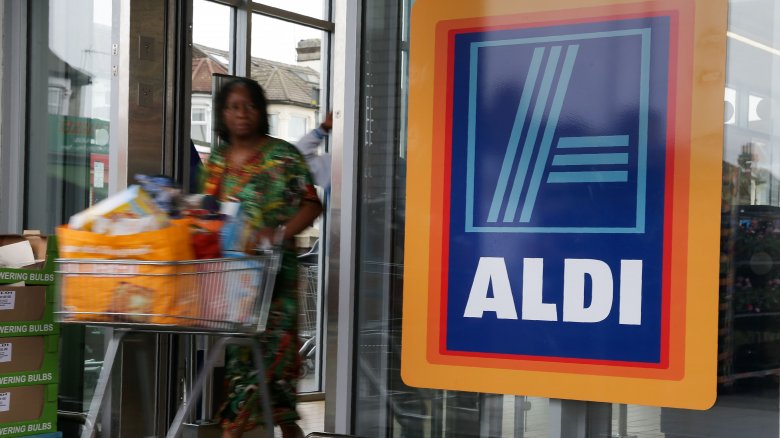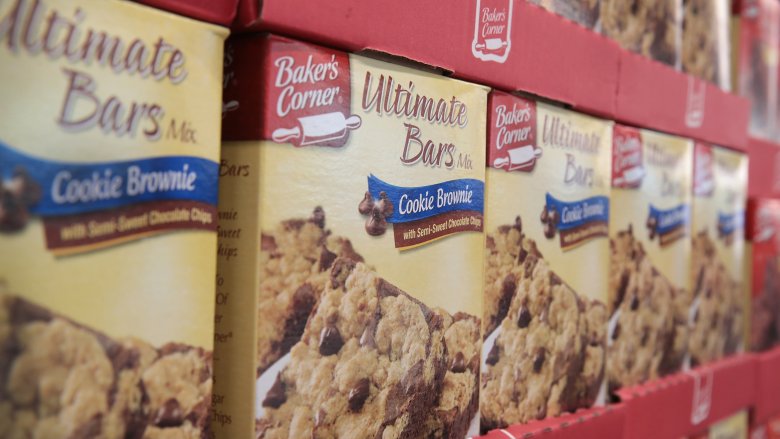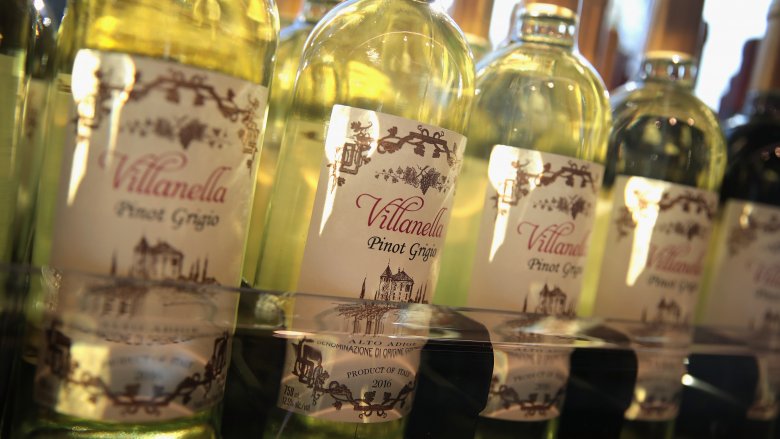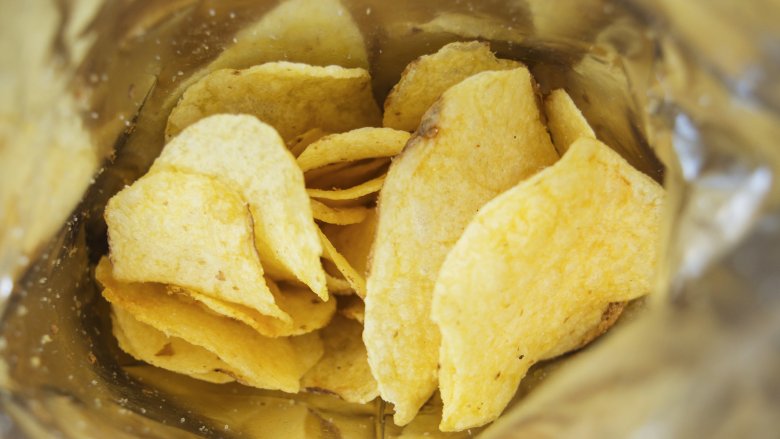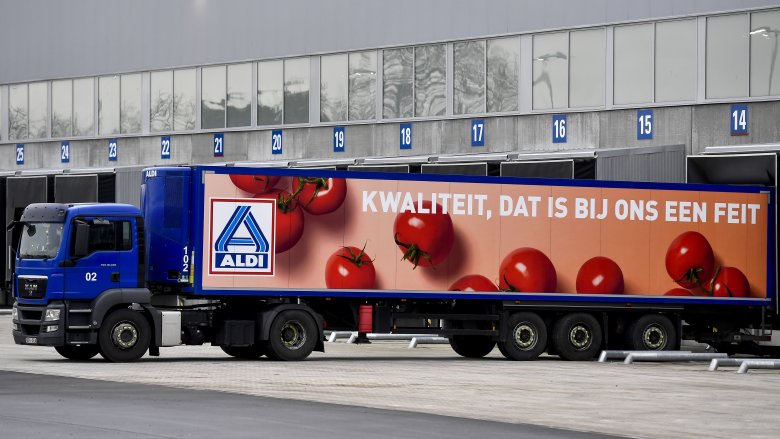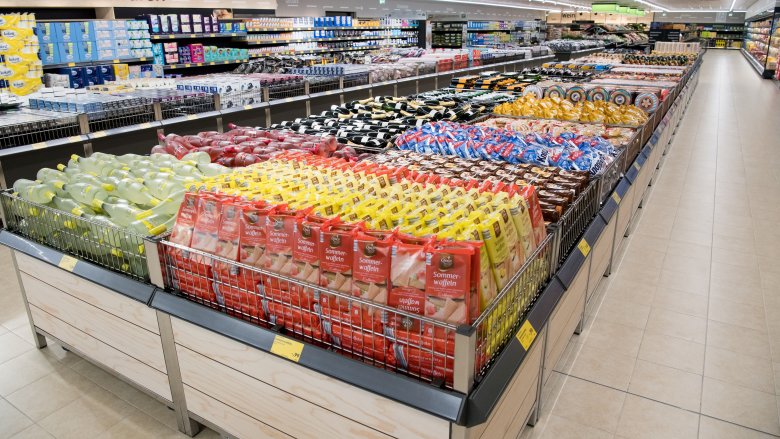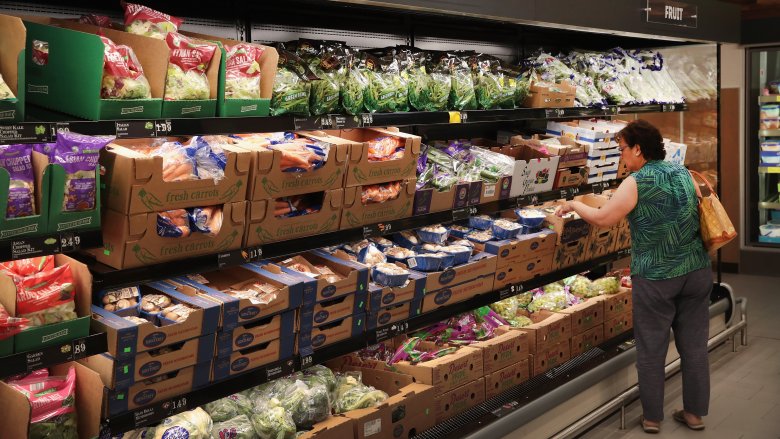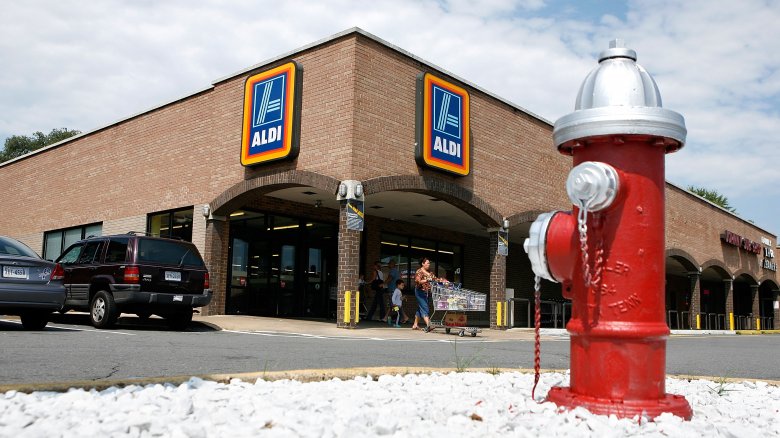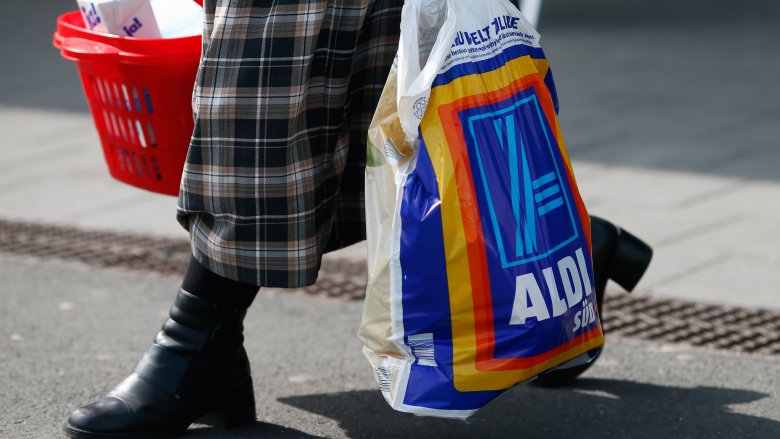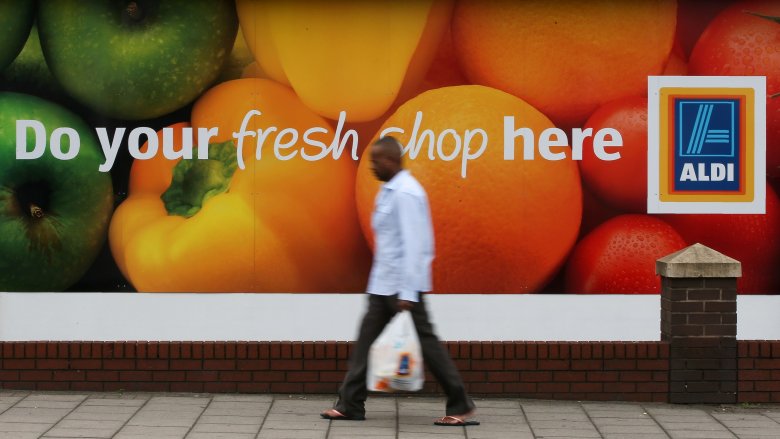Why You'll Almost Never See Name Brands At Aldi
There's no telling what you might find on the shelves at Aldi, especially when it comes to that wonderful, weird, ever-changing section in the middle. Ask any devoted fan, and they'll tell you that Aldi is brilliant. You can walk out with all the produce you need, all the meat and frozen veg, all the cleaning supplies and — if you're lucky — you might just find yourself the proud new owner of an inflatable hot tub, a hammock, a fire pit, and an air compressor.
It might seem like a high probability — or at least, a possibility — that you'll be able to find absolutely anything in the aisles of Aldi, but there is something you'll almost never find: the nation's most popular brand names. Newcomers to Aldi will find all kinds of foreign labels and unfamiliar packaging, but they're not going to find familiar, nationally-known logos. Why not? While it seems like it would be so much more work to make products as well as to sell them, there's a whole bunch of reasons Aldi skips the national brands that most supermarkets and grocery stores carry. And from a business point of view, they're pretty brilliant.
Control over what their products taste like
Let's use Kroger for a quick example: When they put Kellogg's cereal or Heinz ketchup on their shelves, they don't actually have anything to do with what's in the bottle — they're the middle man. Aldi's a little different.
Since they're the ones behind the recipes of about 90 percent of the products you see on their shelves, they have complete control over what goes into their private label brands. Those are products like their Specially Selected, liveGfree, Simply Nature, and Never Any! lines, and that allows them to take quality very seriously.
According to Forbes, Aldi's test kitchen performs tens of thousands of tests on their products to make sure they're up to corporate's rigorous standards. Outsiders are rarely allowed into the kitchen, but in 2013, The Telegraph got to go inside. They learned that Aldi staff conducts daily meetings where products are tasted, tested, and tasted again — at least 30 separate times before it goes on sale. Every single product is also up for review at least once a year, and any time a competitor launches a similar product, Aldi's brand goes up against the new rival and is put through another round of comparison testing. That's absolutely not something that could be done with national brands, and it gives Aldi complete control over the products on their shelves.
They can respond faster to changing tastes
Aldi brings their private label brands to their shelves by establishing long-term, high-quality relationships with their suppliers, and according to Aldi co-president Brent Laubaugh (via Store Brands), that's incredibly important. Since they're not just buying, say, 50,000 cases of Frank's Red Hot Sauce from a distributor and they're instead working with their supplier to develop everything from recipes to packaging — and then guaranteeing enough sales to supply all their stores — that makes for a very different relationship that benefits both parties.
Because of that relationship, Aldi can rely on their manufacturers to give them the inside scoop on what's going on in the industry. There's a new development in packaging or technology? You can bet Aldi's going to know about it.
There's something else at work here, too. Because of the supply chain model they have in place — and because they're not relying on national brands — they can adapt to changes in the market and in food trends much, much faster. While it might take a national brand two whole years to bring a new product to market, Aldi can work directly with their suppliers and manufacturers to do it in about nine months or less. It makes them very good at reformulating recipes, too. According to Forbes, 2015 saw Aldi reformulating the recipes for all their SimplyNature products to remove 125 ingredients in response to customer wishes. That's no small task, but they did it — and customers know it.
They're pretty sure they can do better
Aldi doesn't like to brag, but there's plenty of others who will do it for them. Because of the strict controls Aldi has in place, they're more particular about the products on their shelves. And those products are so good they've won an almost unbelievable number of awards, accolades, and more than a few blind taste tests — even when they're put up against the nation's favorite brands.
At the end of 2017, Aldi announced that they had quadrupled the number of awards taken home by their private label brands to more than 200 — including ones given by BrandSpark, the Gluten-Free Buyers Guide, and Parent Tested Parent Approved.
There's an almost infinite number of blind taste tests out there that Aldi has dominated, too. When The Sydney Morning Herald put Aldi products up against name brand favorites in blind tests, Aldi won in 10 out of the 14 categories. Good Housekeeping said Aldi's Christmas pudding beat out 32 competitors to grab their top honors in 2017, and when Taste of Home tested a series of Aldi products — including ice cream, bagels, hummus, and juice — against national brands, Aldi was the overwhelming winner. You get the the idea.
Compare the space savings
Aldi has a ton of strategies in place to help keep their prices low. Some are pretty surprising — like how they can save money by stocking their own private label brands over national brands. How?
Let's use Lay's as an example (but they're not the only ones who do this). You tear open the bag, and it's only about half full of chips, right? According to Mental Floss, that's nitrogen in your bag, put there to keep the chips fresh and also to keep them from becoming crumbles during the shipping process. But The Guardian says that occasionally there's something more diabolical to it: Sometimes, that air really is included so manufacturers can make the boxes bigger, and make it seem like you're getting more for your money. Aldi, on the other hand, isn't concerned with that.
Go back to that bag of chips, and let's say you can fit 12 on the shelf. If it wasn't for the empty space, you could fit 24... and not just on the shelf, on the truck they were delivered to the store in, too. When Aldi skips the name brands in favor of their own products and packaging, they can design more efficient packaging that ensures there's no wasted space anywhere in the supply chain — right down to how much product can fit on the truck, which in turn impacts just how much money they spend on shipping. When it's all about efficiency and saving money, every bit counts.
Bulk buying
Next time you head into a regular grocery store, take a look at something. How many different brands of chocolate chip cookies are there? How about granola? What about BBQ sauce, mustard, and pasta sauce? Is all that really necessary?
That's what Aldi realized, and consumer savings expert Lauren Greutman explains it this way:
Take mustard. Where a traditional grocery store might want to buy 5,000 bottles of mustard, they're going to have to split that number up and order a couple hundred each of different brands and different styles, because that's what customers expect. But Aldi isn't going to be stocking French's, Bertman's, Coleman's, Heinz, Grey Poupon, Plochman's, and Weber's. They're just going to be buying 5,000 bottles of their own mustard — and that's going to give them some serious bulk buying power and allow them to take advantage of all kinds of discounts. A good portion of that is going to get passed on to the customer, and how many different types of mustard do you really need, anyway?
Low overhead and minimal stock
Imagine keeping a traditional grocery store stocked with products from dozens and dozens — perhaps hundreds — of national name brands. Customers are going to be angry if they expect one particular brand of oatmeal and it's not on the shelves, right? That means keeping a stock in the back, and it also means keeping valuable dollars tied up in merchandise.
But since Aldi doesn't deal with name brands on a massive scale, there's not a lot about the supply chain that's out of their control. According to the Harvard Business School, Aldi's reliance on private label brands gives them more control over the supply chain and allows them to use a business plan called the "just-in-time" inventory model. What that means is that they can order stock when they know they're going to need it without having to worry about whether or not it's going be there on time. As a result, they don't have to keep capital tied up in stock that's just sitting around waiting to be put on shelves. It streamlines the whole process, eliminates the need for massive warehouses, and even cuts back on the number of people they need to manage the operation.
And it's a big deal. The Balance says the only way the model works is if a company has a network of super-reliable, incredibly efficient suppliers, and Aldi is able to make sure they have that in place by making their own products.
That packaging is a big deal
One of the ways Aldi has streamlined their operation is to develop packaging that doubles as displays. Next time you're there, take a look at the shelves. Chances are pretty good you'll see, say, cardboard boxes of cat treats piled on the shelves. One is ripped open, and customers are picking up Fluffy's favorite snacks from there. That box is the same box they were shipped in, and the Harvard Business School says not only does this no-frills packaging prevent a ton of waste, but it cuts down on the time employees spend unpacking and arranging displays.
Now, consider a traditional grocery store stocking name brands. Chances are good that you've seen employees hauling around a massive cart of empty cardboard boxes and packing materials, then spending hours patiently unpacking merchandise and stocking shelves. All that extra packaging costs money, and that patient employee? They're getting paid to unbox and stock, all things that Aldi employees can do in a fraction of the time for a fraction of the cost.
Since Aldi can design the packaging of their private label brands, they take the opportunity to add some more convenience. Each Aldi private label product has more than one barcode — sometimes three or four — and The Guardian says they're designed that way so cashiers can swipe an item without having to juggle it and look for the barcode. It's all about efficiency, and national brands just don't have that same kind of forethought.
Smaller stores
According to the Food Marketing Institute, the average grocery store size has hovered between 40,000 and 48,000 square feet since 1998. You've also got supercenters like Walmart, who — according to Nasdaq — averaged around 162,000 square feet back in 2010 (although that number is slowly decreasing). For most stores, all that space is needed: MarketWatch says that as of 2017, typical grocery stores carry between 40,000 and 50,000 items.
That's a shocking number of things, and how many of those are — for example — ketchup? You've got a few different offerings from Heinz, you've got your French's, Sir Kensington's, Whataburger, Hunt's, you've got your fancy ketchups, your organic ketchups, your standard ketchups... you get the idea. You know what you have at Aldi?
Ketchup.
No one going into Aldi expects them to stock their favorite national brand, their cousin's favorite, and their weird neighbor's favorite. Aldi shoppers expect ketchup, and they get it — and because they devote only a small section to ketchup (and it's the same for other products) instead of half an aisle, their stores only average about 17,000 square feet. That means much lower costs, lower overhead, lower prices, and more customers.
Private label brands inspire store loyalty
So, here's a question: How do you make sure the customers you've worked so hard to get through your doors decide to come back? One way is to give them a product they can't get anywhere else.
If your family loves Kellogg's Corn Flakes, that's great — but you can get those at Walmart, Kroger, Wegmans, etc. But if your family decides they prefer some liveGfree granola for breakfast, there's only one place you're going to be able to get that: Aldi.
That's not the only example out there, and according to grocery analyst Phil Lempert (via DigiDay), offering products that customers can't get anywhere else is such an important way of inspiring customer loyalty that it's one of the things that's fueling Aldi's massive U.S. expansion. It's perfect timing for them, too. In 2019, the retail consulting firm Daymon released results from their surveys suggesting that 85 percent of shoppers find private label brands just as good as national brands, and that makes it a brilliant strategy for capturing part of the marketplace.
The margins on national brands are shockingly bad
Put yourself in Aldi's shoes for just a minute. Now, let's say you have the chance put Silk Soymilk on your shelves, or give that space to your own SimplyNature Soymilk. It's going to cost you to stock either product, and while Aldi is notoriously secretive when it comes to numbers, we can look at some of the market research on margins and costs (via The Conversation) to see just why Aldi might opt away from name brands.
Some surveys have suggested that of the stores that choose to carry private label brands, about 85 percent say profit margins have something to do with the decision. When it's all said, done, and sold, a private label product can cost between 40 and 50 percent less for retailers to sell — and that's huge. It varies by product, too. Some private label bottled waters give stores more than a 70 percent gross margin on the sale, and when you compare that to the 45 percent margin on name brands, well, there's no competition there, is there?
Millennials are turning away from name brands
It's no secret that millennials get blamed for a lot of things. But here's some good news — you can thank them for helping to drive up the popularity of private label brands.
According to Frozen & Refrigerated Buyer (via RetailWire), millennials love private label brands. While consumers who fall outside of the millennial demographic typically buy around 25 percent private label, millennials average 32 percent — and about half plan to gravitate more toward these same private labels in the future. There's a number of things at work here, but one of the big things is that this generation just hasn't developed the same loyalty to name brands that previous generations did. They're also more likely to shop at stores like Aldi, and to form strong opinions about the private label brands they buy there. Millennials, says Progressive Grocer, are a unique group who aren't willing to compromise on quality, who are incredibly savvy when it comes to getting good value for money, and who weren't around to remember when opening a private label product was opening a mystery box of horrors. We all know how millennials are shaping the retail market and have a huge amount of spending power, so here's an opportunity to thank them.
Name brands do pop up occasionally
But don't give up hope! There's still a chance you just might find your favorite name brands at Aldi, and there's a few reasons why.
Aldi U.S. is a little different than their European branches, and according to them, that's because they've listened to American customers and added a very small percentage of name brands to their regular rotation. Remember, more than 90 percent of products aren't going to be national brands, but there's still a place they might show up: That magical, mystical, and oftentimes whimsical place that is the middle aisle.
Those ever-changing bins are more accurately called Special Buys, and it doesn't matter where in the world you go, Aldi stores everywhere have a stock of ever-changing deals that are so good that when they're gone, they're gone. We took an in-depth look at these deals here, but when it comes to name brands, the important part is something called "opportunistic buying." That happens when Aldi buyers get approached by companies looking to offload things like overstock at deep discounts, which Aldi buys in bulk and then adds to their Special Buys bins. It's entirely possible your favorite name brands might show up there, and when they do, pick them up. It's a deal that won't last.
